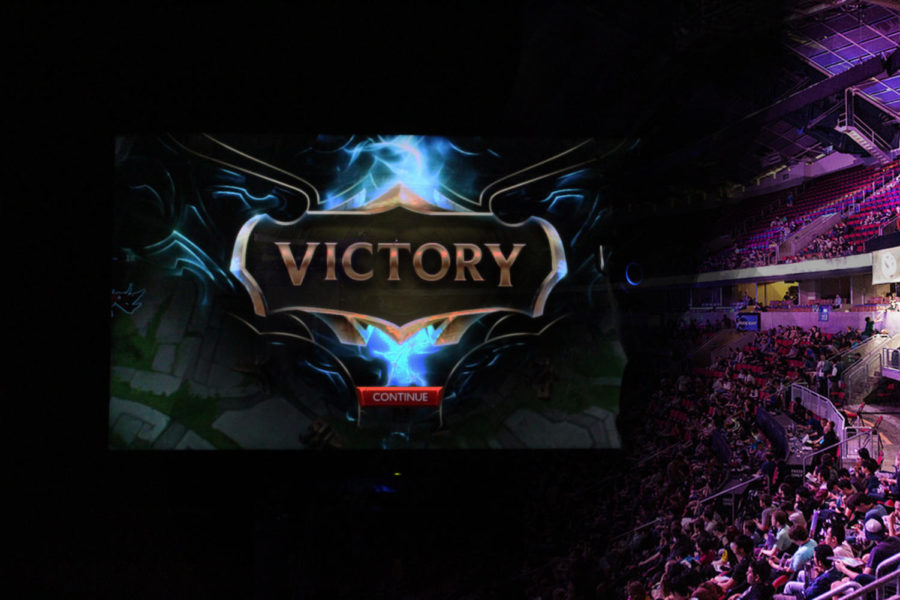The prize pool for DOTA 2’s tournament, The International 2018 is $25,532,177.
That’s enough money to buy one Toyota Corolla every day for 1,365 consecutive days, nearly 3.8 years. This is 443 times the estimated 2017 median household income in the United States.
Just five years before, The International’s prize pool was $2.6 million. This rapid increase is due to the growing popularity of esports, also known as electronic gaming or professional gaming.
Despite the negativity that some hold against esports, it has grown to become one of the most watched sporting events in the world with tournament prize pools equaling those of traditional sports.
This growth was not possible without the rise of a new form of entertainment: live streaming.
There are many different streaming platforms which include Youtube, InstaGib, and Mixer. However, none have been as impactful as Twitch.
Twitch originally started off as Justin.tv, created by Justin Kan on Oct. 10, 2006. In February of 2014, Justin.tv officially became Twitch. It has then grown into a massive platform for people to “come together each day to create their own entertainment,” according to its website.
“It’s almost unbelievable that slightly more than three years ago, Twitch didn’t exist. The moment we launched, we knew we had stumbled across something special,” said Emmett Shear, CEO of Twitch, in an announcement letter released on Aug. 25, 2014. Twitch had been purchased by Amazon for $970 million.
Its success and popularity are partially due to its ease of access. Anyone with a device and an internet connection is able to watch a live stream. In addition, anyone can stream from anywhere as well, respectively.
Twitch has become the platform for esports, providing people access to nearly every esports competition in the world.
“Not many people will have a chance to go and watch esports competitions in real life, but Twitch is a good platform [to watch] good players stream their skills,” said Jia Hao Li, senior and president of the League of Legends club at Carlmont High School.
Streaming has become essential for the lives of many professional gamers. A gamer’s salary is often based on performance; however, not all professional gamers can rise to the top of their respective fields.
Kuro Takhasomi, a DOTA 2 player, is the highest earning professional gamer in the world, with nearly $4.1 million acquired through multiple victories in 91 tournaments. In contrast, the average professional gamer will earn a salary between $1000 to $5000 a month.
Streaming allows professional players to promote themselves, gain a fan base, and showcase their skills to an audience. This provides a platform for them to earn money.
Streaming also becomes a reliable fall back for professional gamers after they retire.
Despite retiring in 2011, former League of Legends professional Michael Santana, better known as “Imaqtpie,” still streams for a living.
Streamers can acquire revenue through monthly subscriptions of $5 and donations from viewers. Subscribers often receive exclusive access to features that normal viewers won’t have. Streamers with a large fan base may also receive sponsors from companies who wish to promote their products.
These sponsorships are often related to the world of gaming. Some examples include game manufactures to promote new games or consoles such as Sony, Nintendo, and Microsoft. Sponsorships also include gaming accessories for streaming such as keyboards, headphones, mics, mice and mouse pads. HyperX, Corsair, and Razer are examples of such companies.
According to Forbes, the top Twitch streamer, Ninja, currently makes $350,000 per month off Twitch subscriptions, not including donations or ads.
Twitch has been one of many instrumental events that contributed to the spread of the professional gaming industry.
The first recorded gaming competition occurred in 1972 with a years subscription to “Rolling Stones” as the prize. Since then, esports has expanded from its small beginnings into a massive international industry.
Twitch offers an opportunity for anyone to stream, although not everyone can make a living off this alone.
Despite the aspirations of some, the idea of a professional career in gaming and esports is often opposed.
“In high school, you’re supposed to study and do good in school so you can have a good future, but if you just play games, you’re just wasting your life,” said sophomore Eugenie Chau.
Major debates have been brought to light in recent years over the social impact of video games and their effects on their player base. Parents are especially concerned about whether video games encourage positive or negative behavior.
One increasingly popular concern is whether violent video games promote violent behavior. According to Pew Research Center, a study called “Gaming and gamers” found that four in ten adults believe that violence in video games is related to violent behavior.
However, these concerns are not as prevalent in teenagers.
“I don’t think [games] are more capable to make someone violent than a violent movie does or violent books do,” said Alex Nickerson, a Carlmont sophomore.
Like any other sport, competitive gaming requires athletes to dedicate a large amount of time every day to perfecting their respective game
“They have to practice 10 hours a day or more just to be able to be competitive on the pro scene,” said sophomore Darren Yao.
Yao considers himself a gamer and plays League of Legends. However, he doesn’t wish to become a professional player.
“Personally, I would not [want to become a professional player] because I think I could do better by taking a normal career path like going to college and then getting a normal job,” Yao said. “Even if it’s really rewarding to be a good player, the competitiveness of it makes it really inherently risky to be an esports player.”
A large amount of time spent in front of a screen also brings up more concerns in the well being and health of someone in such a situation.
“I’m pretty supportive of esports. I think its a cool up and coming thing, but at the same time I feel that if it’s abused it could become very unhealthy,” Nickerson said.
In a study by Oxford University called “Electronic Gaming and Psychosocial Adjustment,” author Andrew K. Przybylski explains the effects that gaming has on children aged 10 to 15 years.
“Low engagement was associated with higher life satisfaction and prosocial behavior and lower externalizing and internalizing problems, whereas the opposite was found for high levels of play,” Przybylski said.
The study found that children playing for an hour or less per day on a console or PC tend to be more satisfied and more social in life than kids who don’t play games.
“I’ve had gamer friend growing up that kind of lack the social life because they’re so immersed in it. I believe that video games can enhance someone’s social life if you play and regulate the amount of time you play video games. It can enhance your social life if you want to play with friends or if you meet friends online,” Nickerson said.
This is in line with Przybylski’s study. He found that, while an hour or less will benefit children, those benefits will disappear after one to three hours.
In addition to health concerns, many believe that professional gaming to be nothing more than a game, not a real sport.
“It shouldn’t be considered a sport as it doesn’t emphasize the physical attribute of a sport,” said Ty Takahashi, a sophomore.
According to Gamespot, the US government officially recognized League of Legends esports players as professional athletes in 2013. Yet still, media and people around the world continue to dismiss the idea of a professional gaming athlete.
Professional gaming is not the only pathway for those who love to game. While not all players can be the best, some choose another pathway for the benefit of others.
“There are a lot of jobs in esports that aren’t necessarily players; there are coaches, analysts, and castors [for example]. I definitely think that there will be more opportunities for people to work in esports in the future,” Yao said.
There are many desirable incentives in choosing such a career in esports and gaming. They offer gamers a career where they can make money while doing something they love.
The career path of professional gaming has been advocated by many people, including Rick Fox, a retired professional basketball player who played for both the Boston Celtics and the Los Angeles Lakers.
On December 18, 2015, Fox purchased the League of Legend team slot, formerly owned by Gravity gaming for roughly $1 million and rebranded it as his team, Echo Fox.
Others followed in example after Fox’s investment including his former teammate Shaquille O’Neal. O’Neil, as well as Alex Rodriguez and Jimmy Rollins, invested in RNG Esports on March 17th, 2016.
https://twitter.com/SHAQ/status/710550824561147904
Becoming a professional gamer is now also being supported by major colleges and universities.
Spring of 2016, UC Irvine announced their esports program, UCI Esports. It was the first public university to create an official esports program. It is often regarded as one of the best and most comprehensive in the world.
The UCI Esports program has five pillars: competition, academics, community, entertainment, and careers.
UC Irvine is one of many colleges and universities that now offer scholarships for gaming. This has opened up new potential career paths for young gamers.
“We recruit the best gamers in the world to compete for our teams in the top collegiate leagues in North America. We offer scholarships to players for both League of Legends and Overwatch,” according to the UCI Esports official website.
Other colleges and universities that offer esports scholarships include the University of Utah, Robert Morris University and Stephens College.
With the rapid growth of the esports, Market Research Newzoo estimate the esports industry will reach $1.4 billion by 2020. As it’s popularity increases, it will continue to influence many young gamers to pursue a career in the esports industry.
The pathway toward a future in gaming is becoming easier, with more and more support and opportunities presenting themselves to the younger generations.
Years ago the idea of competitive gaming was a joke. However, with the growing esports industry, more people are starting to accept that esports is real and it’s not going anywhere anytime soon.



